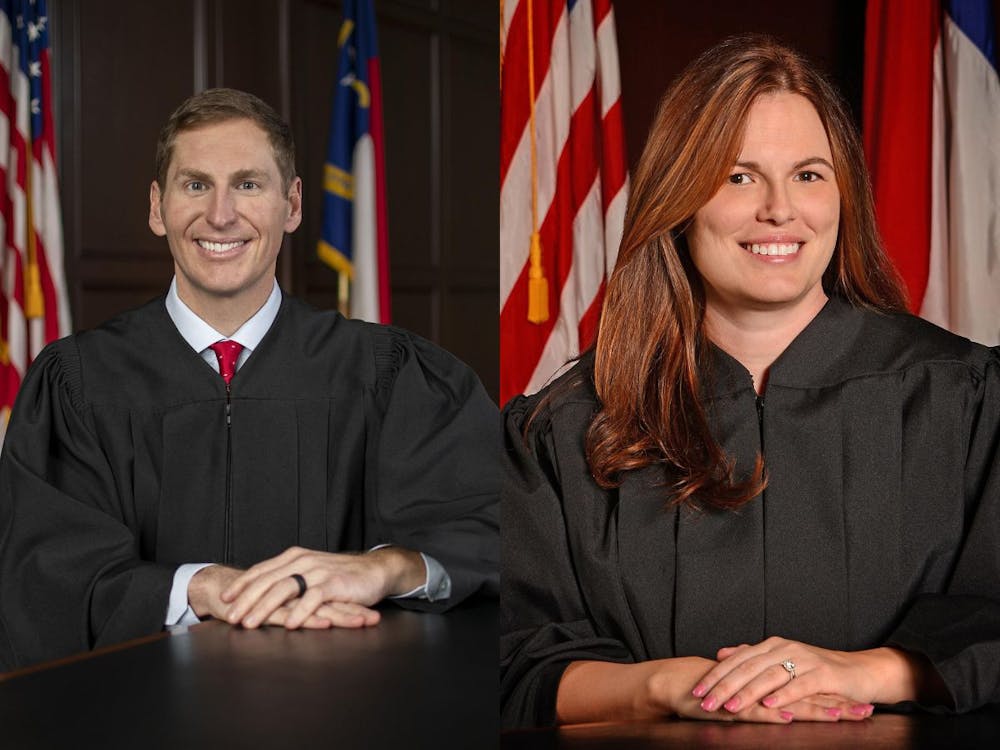In a North Carolina Supreme Court race with over five million ballots counted, a Duke Law student trails by just 623 votes. Now, he’s suing the North Carolina State Board of Elections.
Jefferson Griffin — a 44-year-old Republican pursuing a Master of Laws at Duke — and the state’s GOP sued the NCSBE, claiming that the board did not provide Griffin with public election data he requested in time for him to file protests. As of 12 a.m. Tuesday, three counties — Duplin, Forsyth and Northampton — had not yet finalized their election results.
The deadline for candidates to request a ballot recount is Tuesday at noon, though if the results change, candidates have an additional 48 hours to submit a request.
The lawsuit appeals to the North Carolina Public Records Act — which requires certain disclosures — and argues that four “significant requests” for election data remain “incomplete and outstanding.”
In particular, Griffin requested information on conflict voters — voters suspected of casting both absentee and in-person ballots — as well as voters who used the curbside process. Further, the plaintiffs requested lists of felony convictions and deceased persons, as well as information and NCSBE guidance provided to county boards of elections on how to treat votes cast by convicted felons and deceased persons.
The records that Griffin requested could inform the number of ineligible ballots, which have the potential to impact the outcome of a race with such slim margins.
The plaintiffs argued that while the NCSBE fulfilled some public records requests, some of the information provided was “incomplete or non-identical” to information shared with county boards of elections.
“Defendants' failures have impeded plaintiffs' efforts to meaningfully examine the 2024 general election processes and unlawfully interfered with plaintiffs' ability to evaluate the potential need to file any protests in relation to the 2024 general election,” the plaintiffs wrote in the lawsuit.
The lawsuit states that Griffin had made records requests on Nov. 9, Nov. 11 and Nov. 12, and cited the requirement under the Public Records Act for the custodian of public records to furnish records “as promptly as possible” once a request is made.
“Under these circumstances, ‘as promptly as possible’ does not contemplate failing to provide plaintiffs with records less than [48] hours before a filing deadline,” the lawsuit read. “… Defendants' failure to provide the requested information as required by the Public Records Act is, in effect, a denial of plaintiffs' request, and will cause plaintiffs irreparable harm.”
According to the Carolina Journal, NCSBE spokesperson Patrick Gannon claimed that Griffin’s lawyers demanded that the records be produced by 7 a.m. Monday, which Gannon argued the law did not require.
“The State Board provided the requested records today. In fact, the lawyers for this campaign were informed this morning that the records would be provided today, but they served the agency with the lawsuit anyway,” Gannon said. “In sum, this lawsuit is thoroughly unnecessary.”
On Nov. 6, the count showed Griffin led Riggs by over 10,000 votes. The margin became slimmer and slimmer over time, until Riggs barely overtook Griffin Friday by 66 votes.
In North Carolina, counties hold a “canvass meeting” 10 days after Election Day to certify the results. During the 10-day period — which concluded on Friday — board staff count absentee ballots and research provisional ballots. In a Friday press release, NCSBE stated that several county board of elections could not complete their meetings in time and would resume certifying the results Monday.
Griffin was admitted to Duke Law's Master of Judicial Studies program and is set to begin his studies in May 2025, with an expected graduation date of 2027. He also currently serves as a judge on the N.C. Court of Appeals, where he has written over 200 opinions.
In an interview with The News & Observer, Griffin described that if elected, his top priority would be “applying the law as it is written” and “removing politics from our courts.”
Griffin received his law degree from North Carolina Central University in 2008. He served as a prosecutor in the Wake County District Attorney’s Office for five years, after which he was appointed a District Court Judge in Wake County. Griffin was elected to the North Carolina Court of Appeals in November 2020.
He also serves as a Captain in the North Carolina Army National Guard, where he was deployed to the Middle East between 2019 and 2020.
Griffin’s opponent, Democrat incumbent Allison Riggs, was appointed to serve on the court in September 2023.
“We always knew this race would be incredibly close, but it may come down to just dozens of votes,” Riggs wrote in a Sunday X post.
Get The Chronicle straight to your inbox
Sign up for our weekly newsletter. Cancel at any time.
Editor's note: A previous version of this story mistakenly stated that Griffin had already begun his studies at Duke and reported his expected graduation date as 2026 instead of 2027. The Chronicle regrets the error.

Michael Austin is a Trinity junior and managing editor of The Chronicle's 120th volume.

